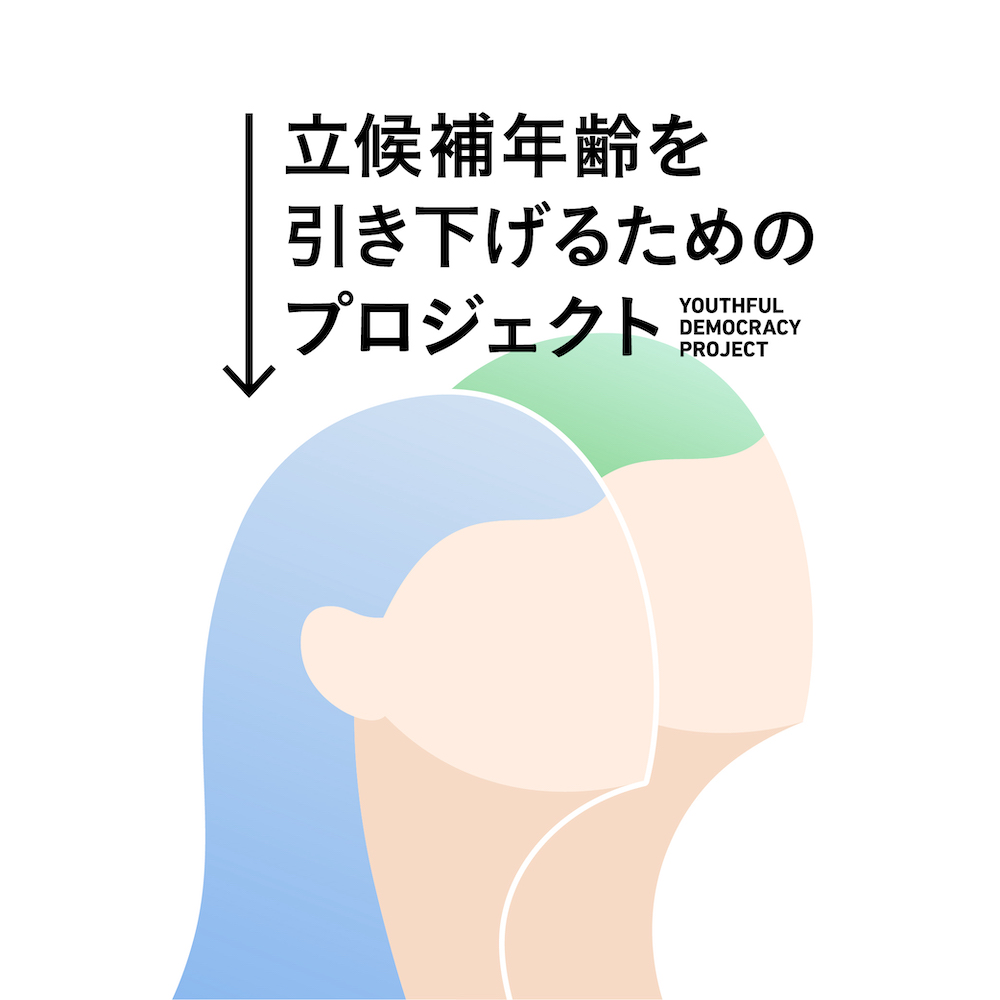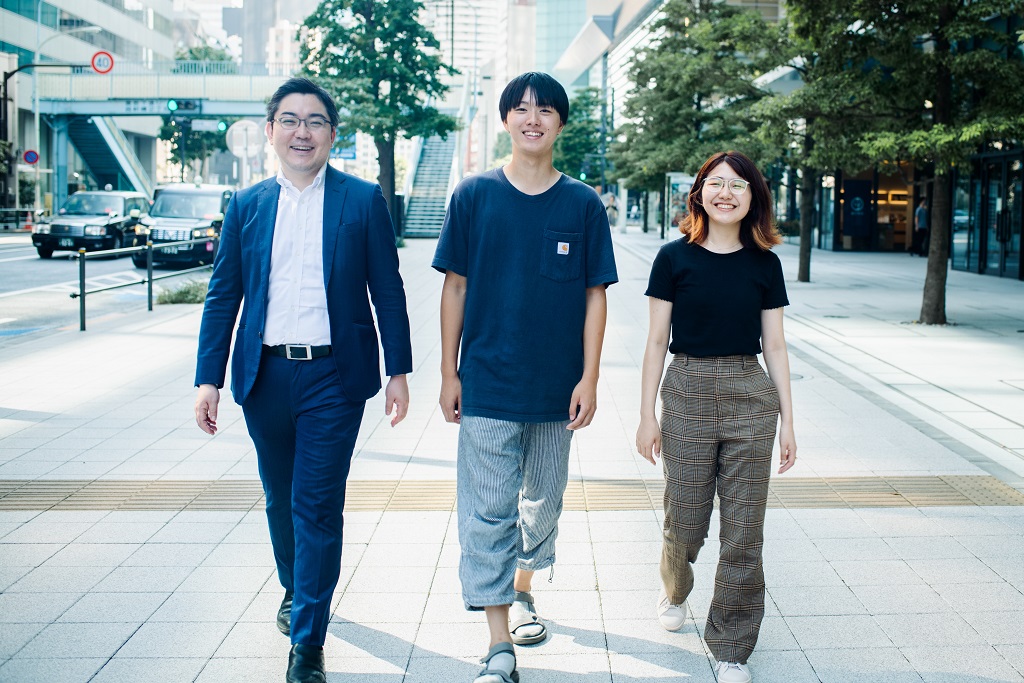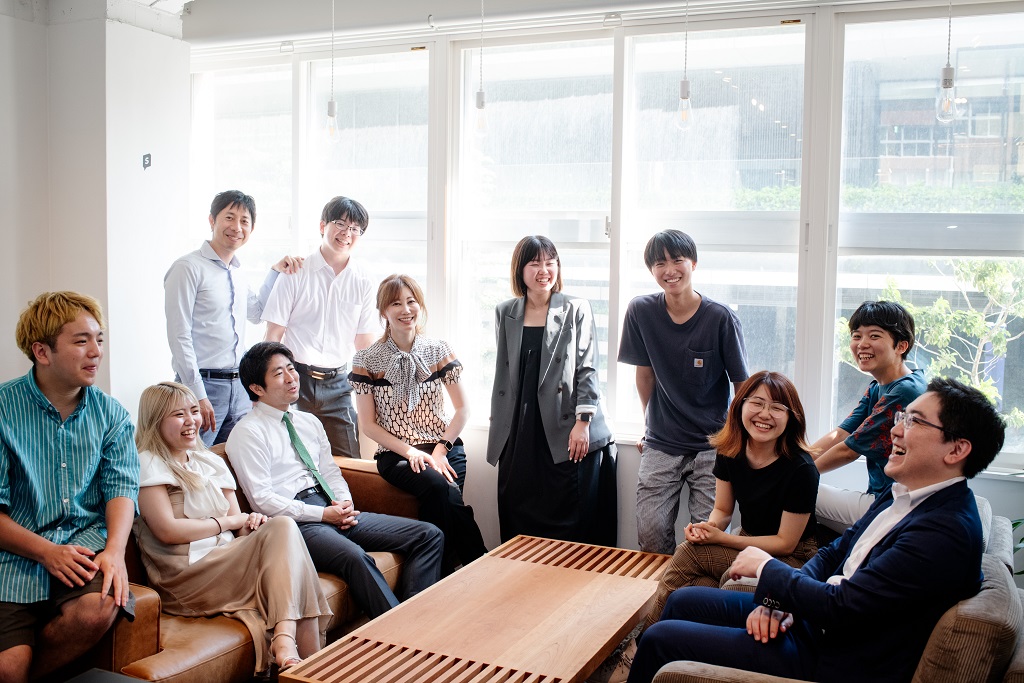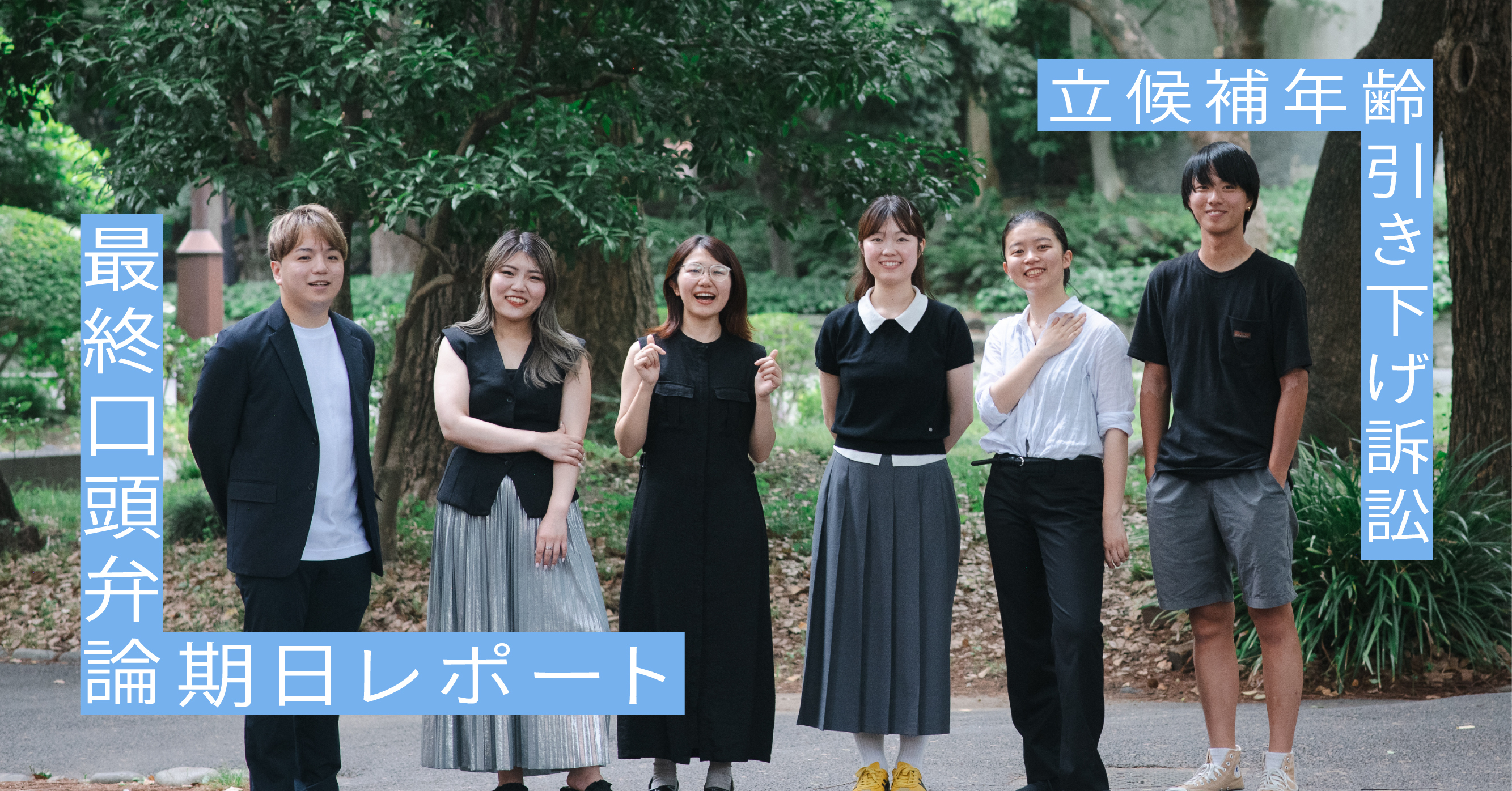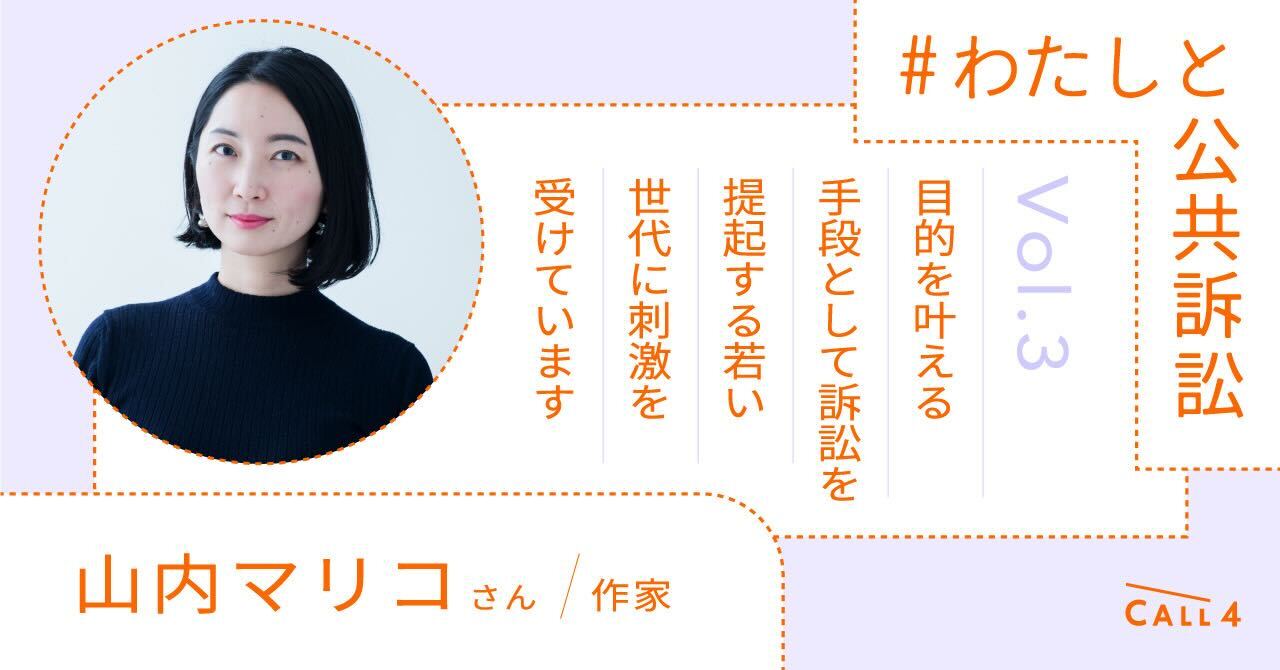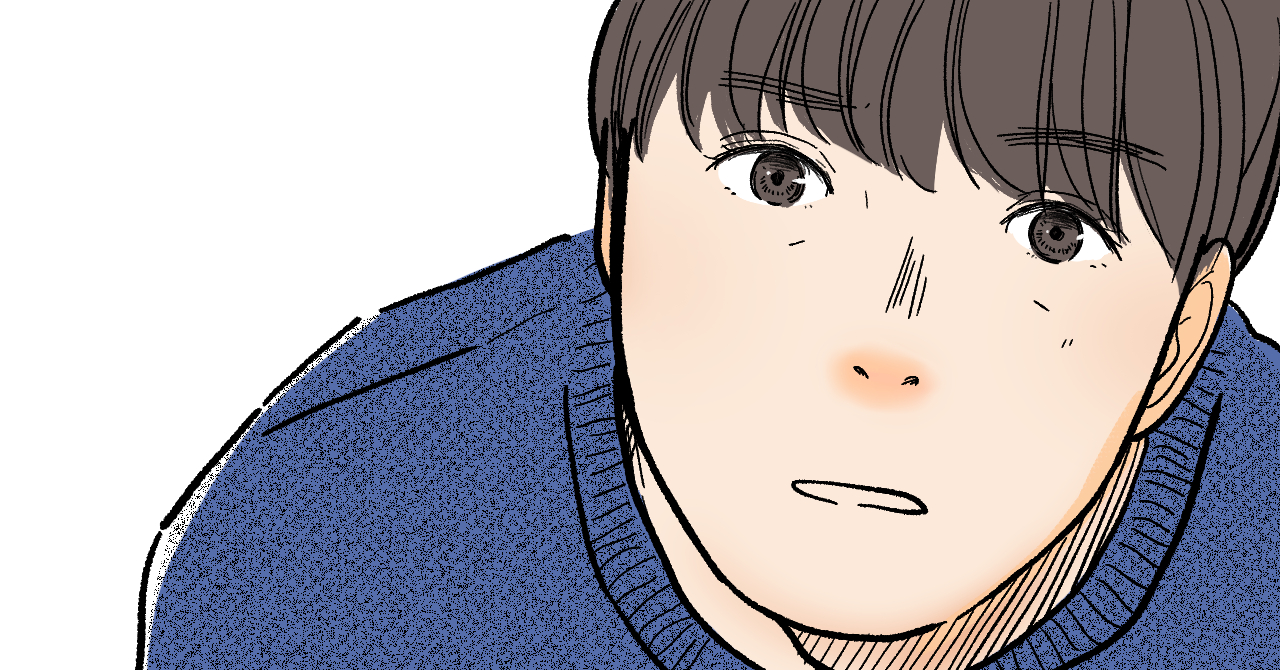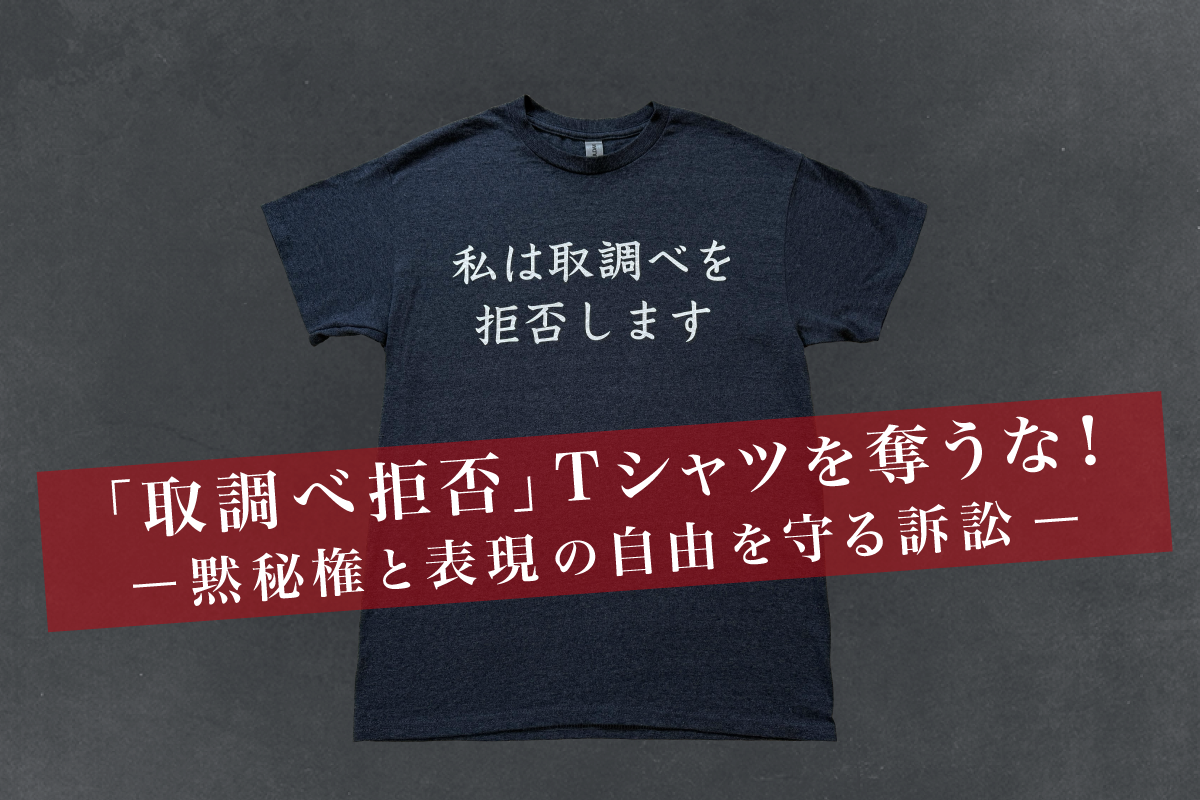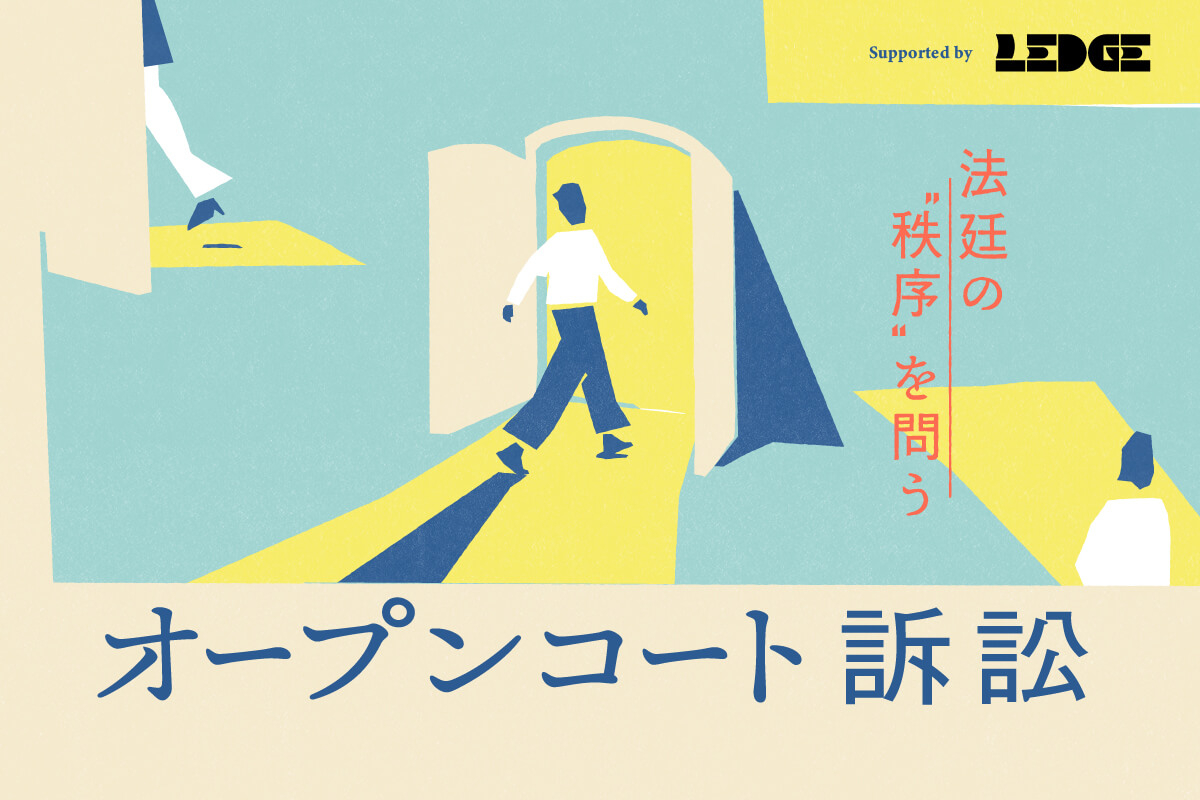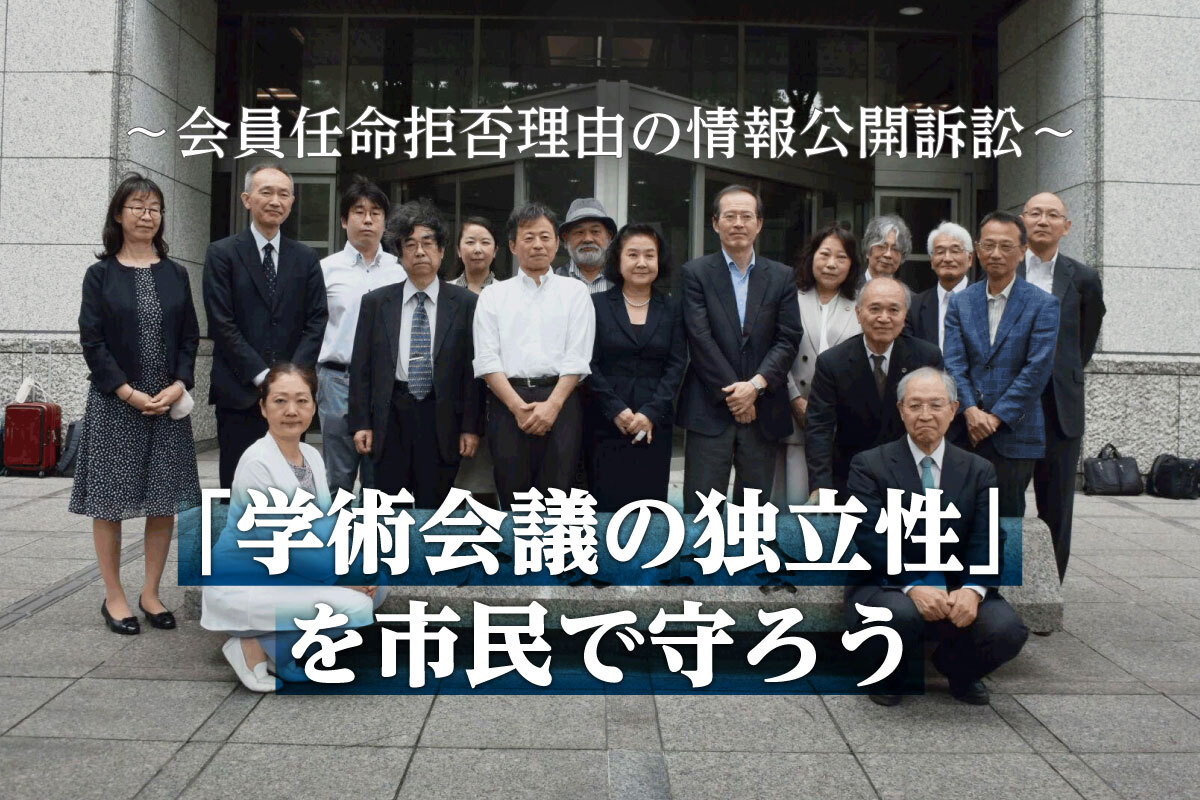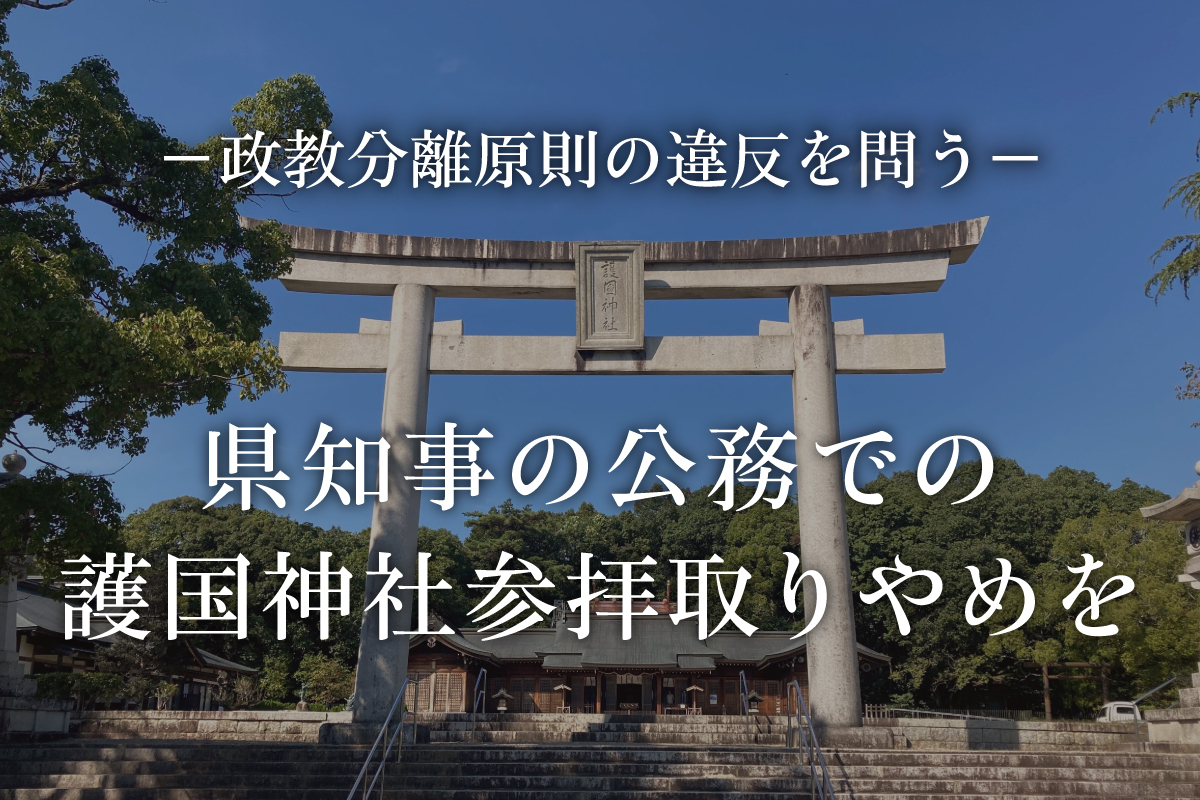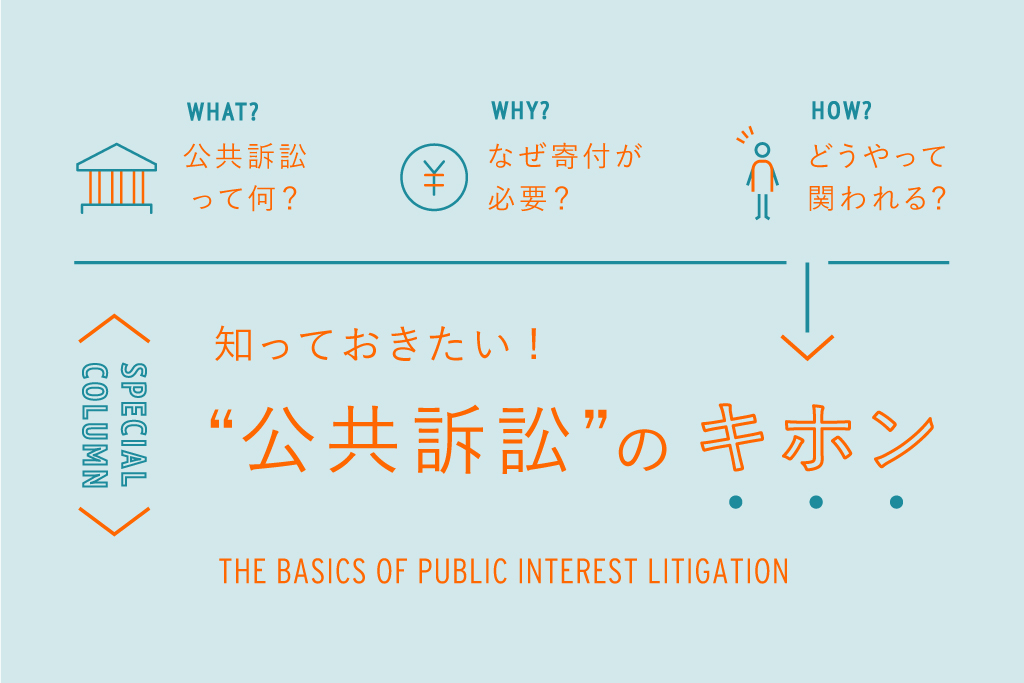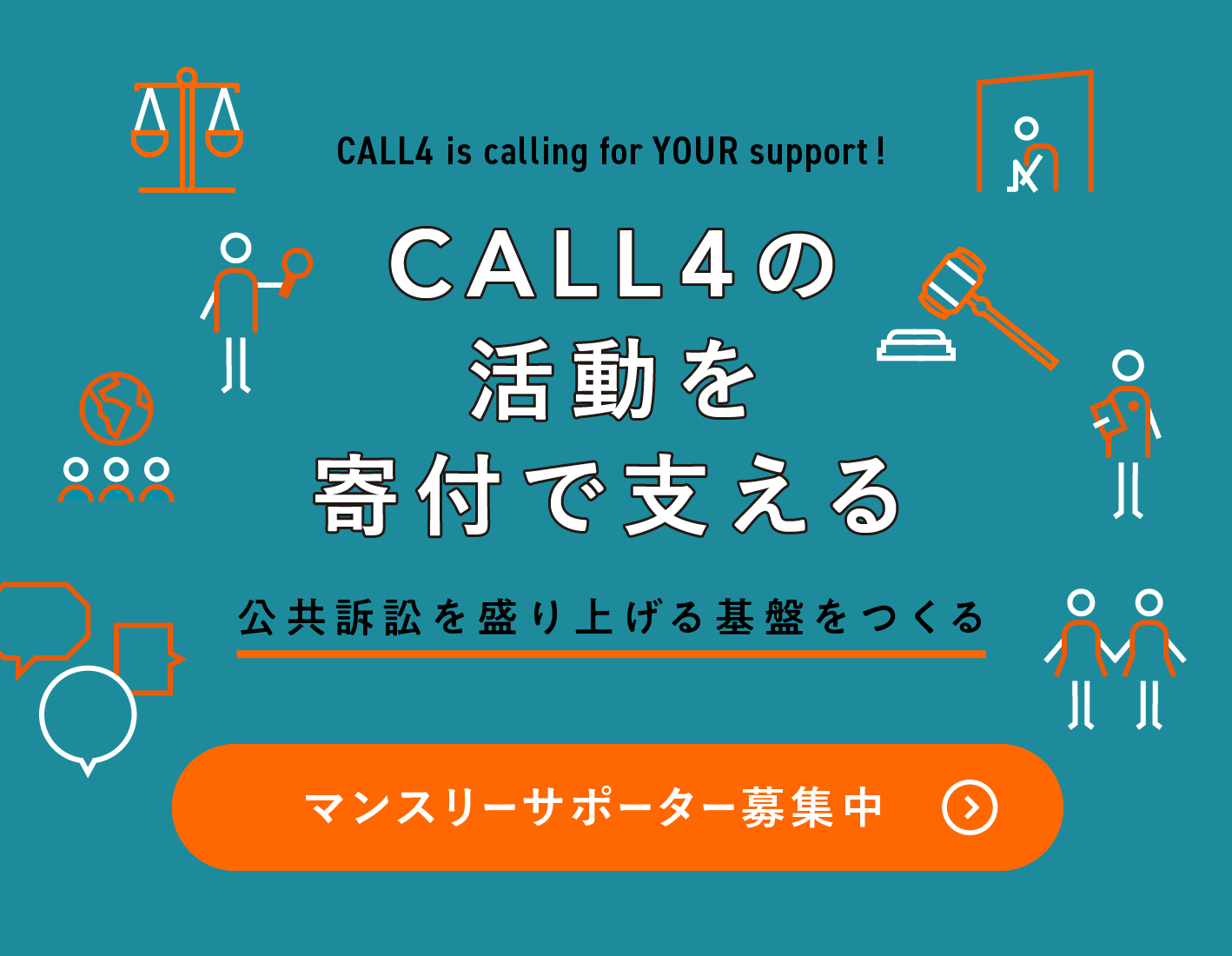立候補年齢引き下げ訴訟 Lawsuit for Lowering the Age of Candidacy
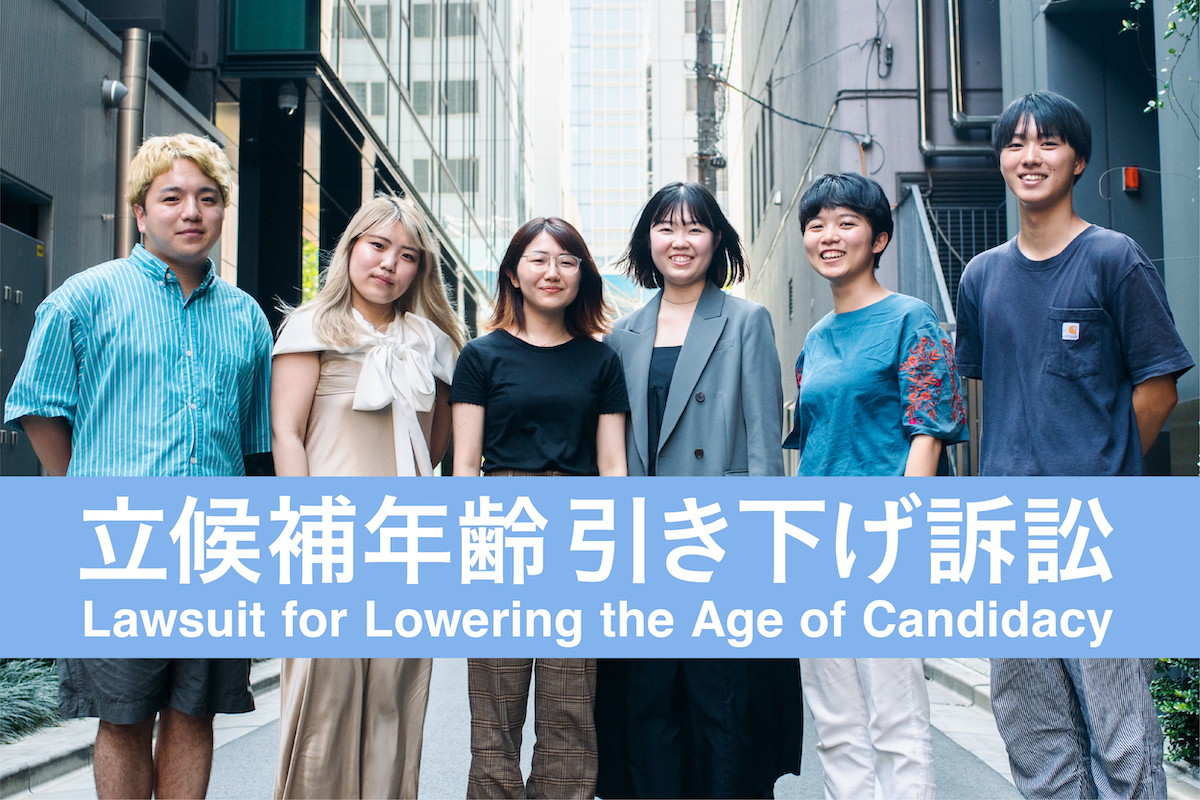
日本が直面する少子高齢社会、中高年が多くを占める政治の場に、若い世代の声はなかなか届きません。戦後変わらない立候補年齢は若者の政治参加を制限し、社会の一員として政治に関わることを難しくしています。長期的な視点を持った10代・20代の声が届く政治は、日本をもっと持続可能で、生きやすい社会にします。若い世代の声が届く社会に向けて、私たちは立候補年齢の引き下げを提案します。 In Japan’s aging society, where the older generation dominates the political arena, it is difficult for the voices of the younger generation to be heard. The unchanged age of candidacy since the post-war era restricts young people’s political participation and makes it difficult for them to engage in politics. A politics that embraces the voices of teenagers and people in their 20s with a long-term perspective will create a more sustainable and livable society in Japan. In pursuit of a society where the voices of the younger generation are heard, we propose lowering the age of candidacy.
なぜ現在の立候補年齢が問題なのか
私たちは裁判を通して立候補年齢(被選挙権)の引き下げを求めます。現在、日本の立候補年齢(被選挙権)は戦後変わらず25歳と30歳です。
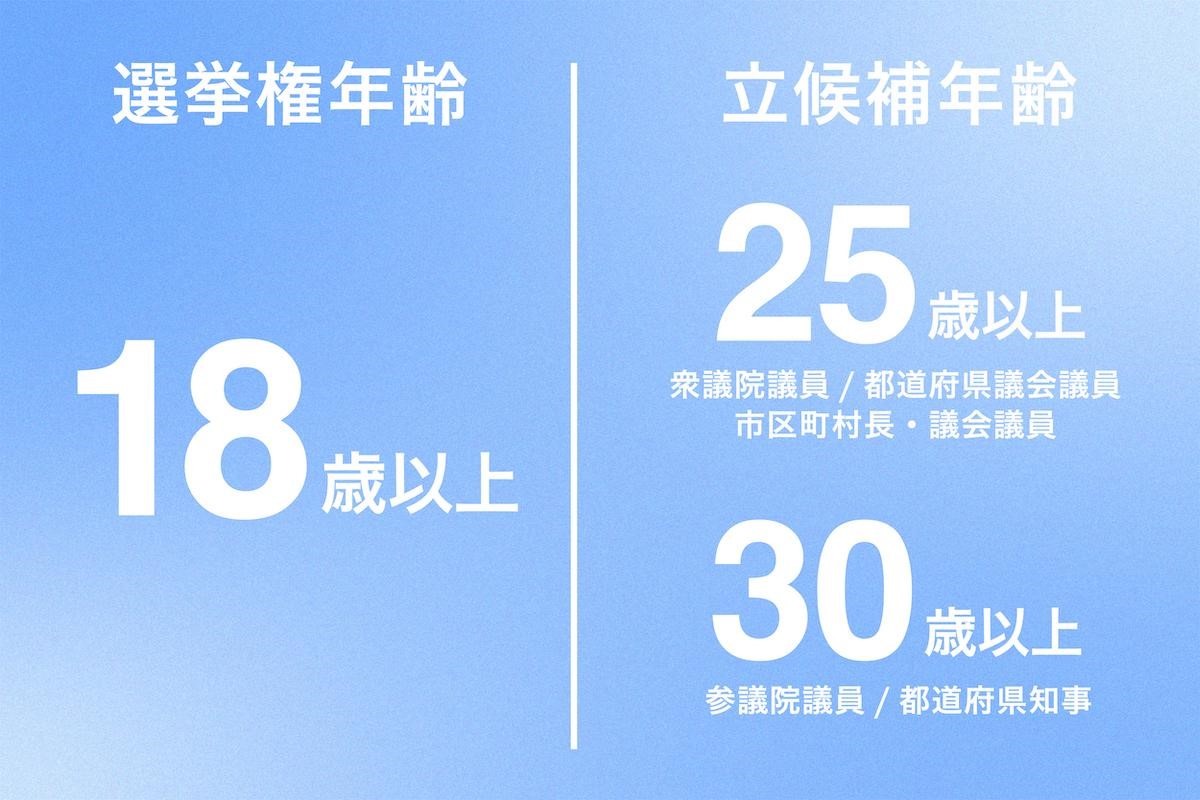
戦後70年以上が経ち、社会は大きく変わりました。2016年には公職選挙法が改正され18歳から投票ができるようになりましたが、立候補年齢は変えられることなく、若者の直接的な政治参加を制限し続けています。さらに指摘すべきは、なぜ立候補年齢が25歳と30歳に設定されなければならないのか、その合理的理由を誰も説明することができないということです。
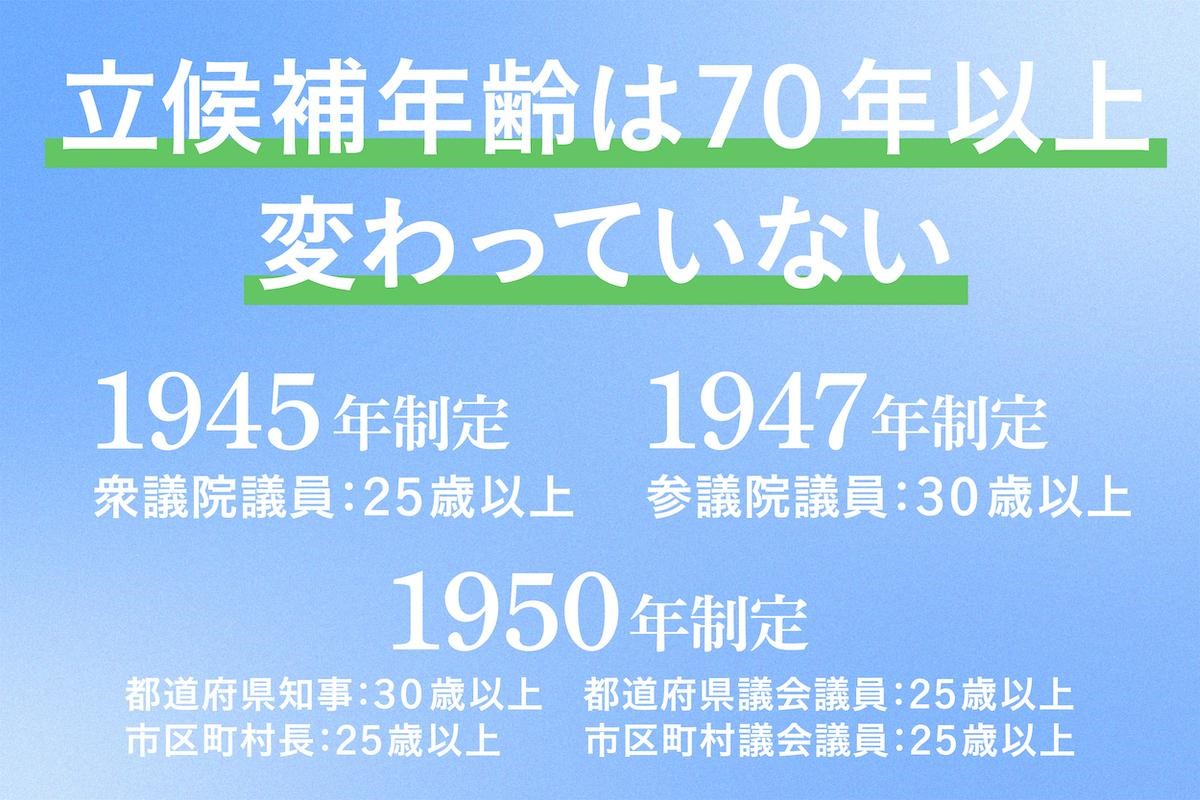
現在、私たち有権者の代表として議会にいるのはほとんどが中高年です。その平均年齢はほぼ60歳と国民全体の平均年齢からかけ離れており、日本に住む全ての人に関わる重要な事項が一部の属性に偏った人たちのみで決定されています。
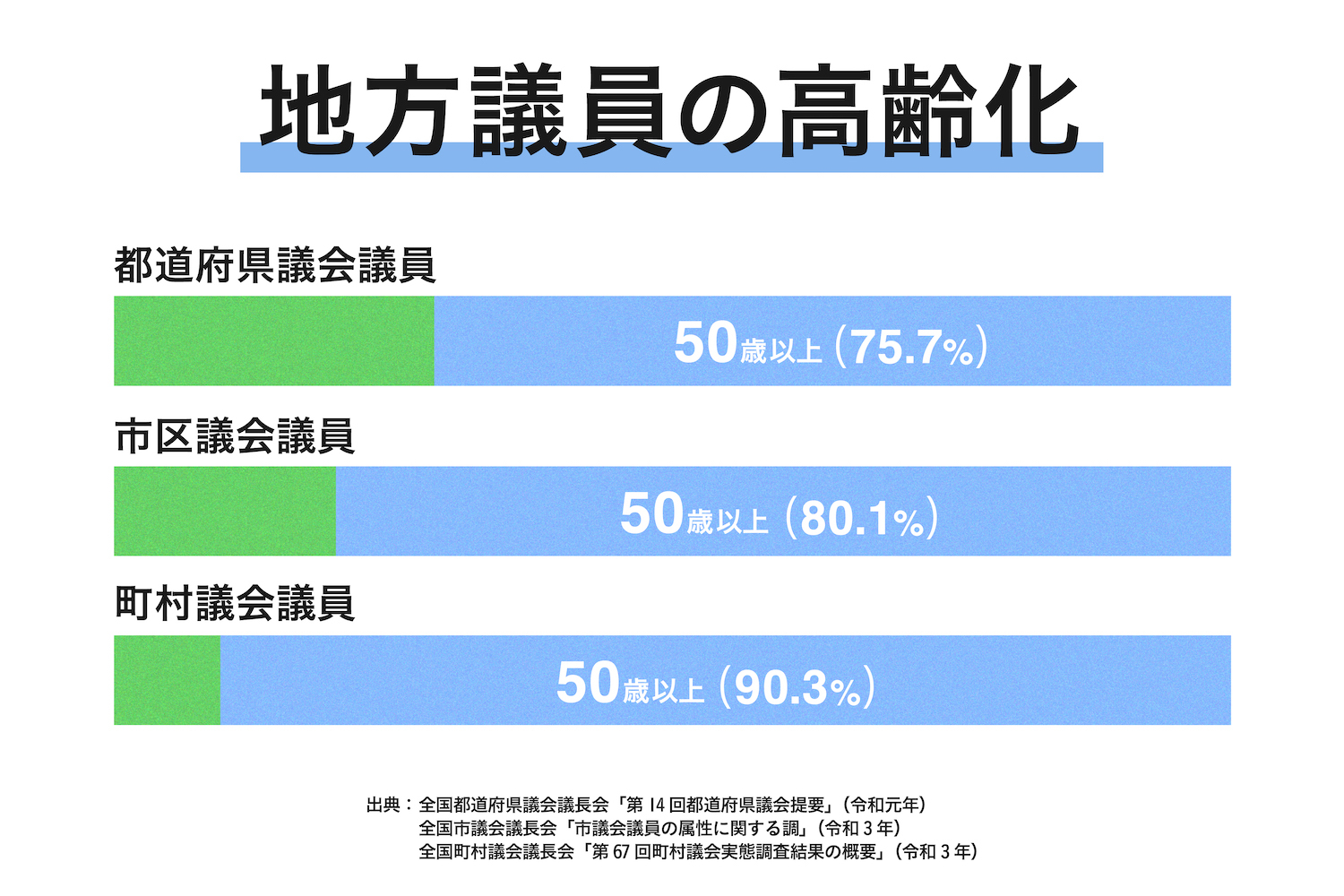
40代で若手議員と言われ、20代、30代との世代間のギャップは当然のこととされています。当事者としての若者の声は政治の場で消化されることなく蒸発しているのです。それは若者の政治への無関心さも助長してしまう深刻な問題です。若者の政治離れや投票率の低さが大きく問題視されますが、こうした政治制度にも問題があると考えます。
多くの人が18歳や22歳の卒業をきっかけにファーストキャリアを選ぶ時代ですが、そのタイミングで「政治家」という職業は選ぶことができません。現行の公職選挙法が定める立候補年齢のままで実際に立候補しようとした場合、25歳となれば働き始めて数年が過ぎた時期に、また30歳となれば結婚や出産を経て幼い子を育てている時期に当たるかもしれません。こうした流動的なライフステージの最中、選挙に立候補できる年齢に達したとしても、それまでのキャリアをあるいは中断し、あるいは捨ててすぐに立候補するのは、落選しても戻ることのできる強固な基盤がある場合を除き簡単ではありません。立候補年齢が引き下げられ、ファーストキャリアとして政治家を選択することができれば、小さなリスクで決断することが可能となります。
国際的に見ても日本の立候補年齢は高すぎる
世界的に見てもOECD各国の中で立候補年齢を25歳以上としている国は少数派です。38カ国のうち23カ国は立候補年齢を18歳に、10カ国は21歳に設定しており、21歳以下と定める国々が全体の約87%を占めています。
※2025年10月19日追記
国立国会図書館編「主要国における被選挙権年齢(資料)」(2020年)公表当時の加盟国は36カ国でした。その後、2020年にコロンビア、2021年にコスタリカが加盟し計38カ国となっています。また、韓国(2021年)、リトアニア(2022年)、メキシコ(2023年)では被選挙権年齢が相次いで引き下げられました。上記はこれらの情報を反映したものです(2025年10月時点)。詳細は「主要国の被選挙権年齢について」をご覧ください。
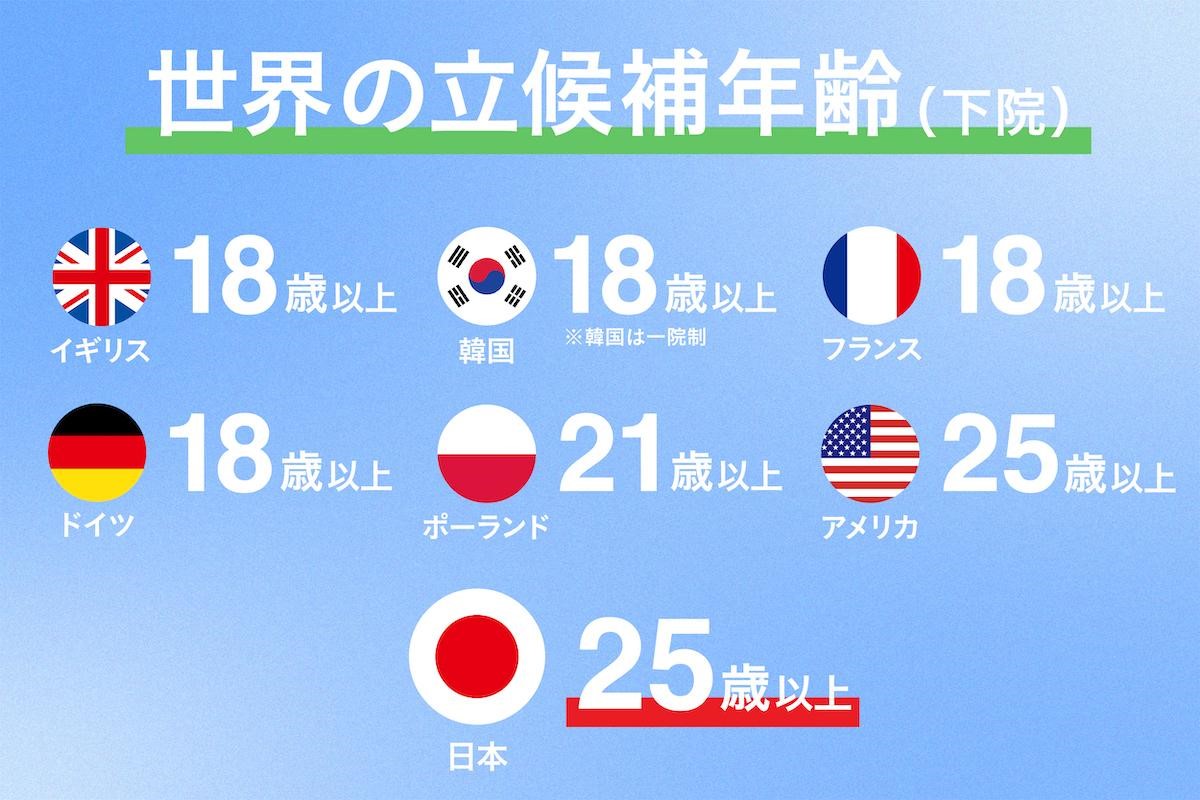
実はこれらの国も当初から立候補年齢を下げていたわけではありません。ここ数十年の間に相次いで若者に立候補を認める制度改正がなされてきたのです。
例えば、イギリスでは、2004年に選挙委員会が「①国際的には被選挙権年齢と選挙権年齢を一致させている例があること、②公選職に関心がありその職務を 十分果たすことのできる 21 歳未満の若者がいるかもしれないこと、③被選挙権年齢の規定により包括的に立候補を規制しなくても、選挙人は選挙を通じて公選職にふさわしい人物か否かを決められること」等を理由に立候補年齢の引き下げを勧告し、これを受けて立法府は2006年の法改正で立候補年齢を21歳から18歳に引き下げました。
ドイツやフランスでは、1974年と2011年に、成人年齢又は選挙権年齢と立候補年齢を同一にする立法により立候補年齢が引き下げられました。
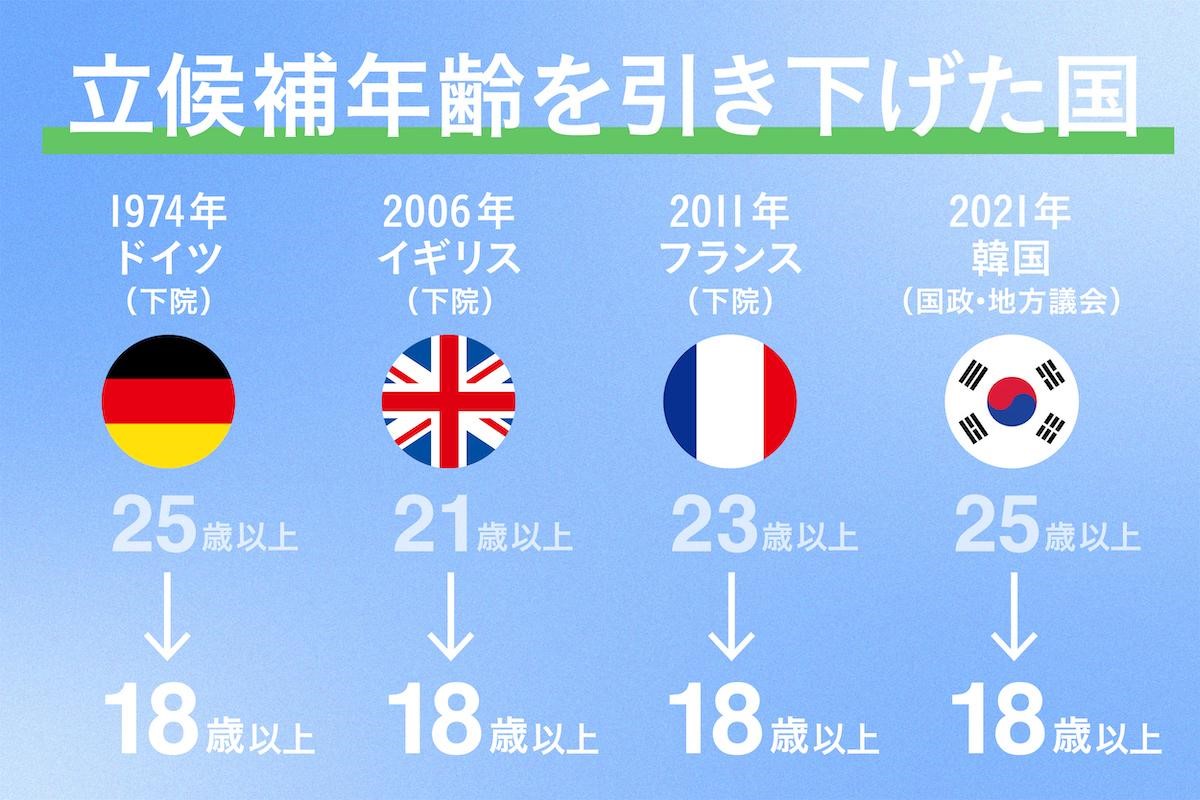
当然ですが、これらの国で立候補年齢が引き下げられたことにより何らかの弊害が生じたなどということはありません。むしろ、どの国でも、立候補年齢の引き下げにより若い世代の政治への関心やコミットが従来より高まったと報告されています。
つまり、立候補年齢を25歳や30歳に維持し続ける合理的な理由はほとんどないのです。この点について引き下げ反対の立場からは、若者には知識・経験・分別が足りないなどと主張されますが、これは典型的な偏見です。若者だというだけで例外なく一律に劣っているとみなされることに合理的な根拠はありません。
なぜ裁判?
これまでにも立候補年齢(被選挙権)の引き下げを求めて政治家への働きかけが行われてきました。2016年の成人年齢引き下げの際にも、合わせて立候補年齢を引き下げるべきとの声が上がりましたが、結局それから7年が経過した今もなお立候補年齢は引き下げられていません。野党の多くは引き下げを求めていますが与党は全く具体的な政治日程に乗せようとしません。18歳から25歳の若者は人口の2割以下と現代の日本社会では少数派に属します。中高年が圧倒的多数を占める現職議員にとって、直接の支援者の多くは自分たちと同世代であり、若者の声を聞くメリットはあまり生じません。それどころか、現職の政治家にとって立候補年齢の引き下げはライバルを増やすことに繋がるためデメリットとすらいえます。構造的に現職の議員が率先して改正に動くことは期待しづらいのですが、かといってこの複雑な激動の社会において、若者の政治参加が選挙の重要な争点となることは期待できません。つまり、立法での解決があまり期待できないのです。このような問題こそ、司法において議論されるべきです。私たちは証拠と論理を武器に裁判という手続きを通じて制度の是正を求めます。
原告たちの思い
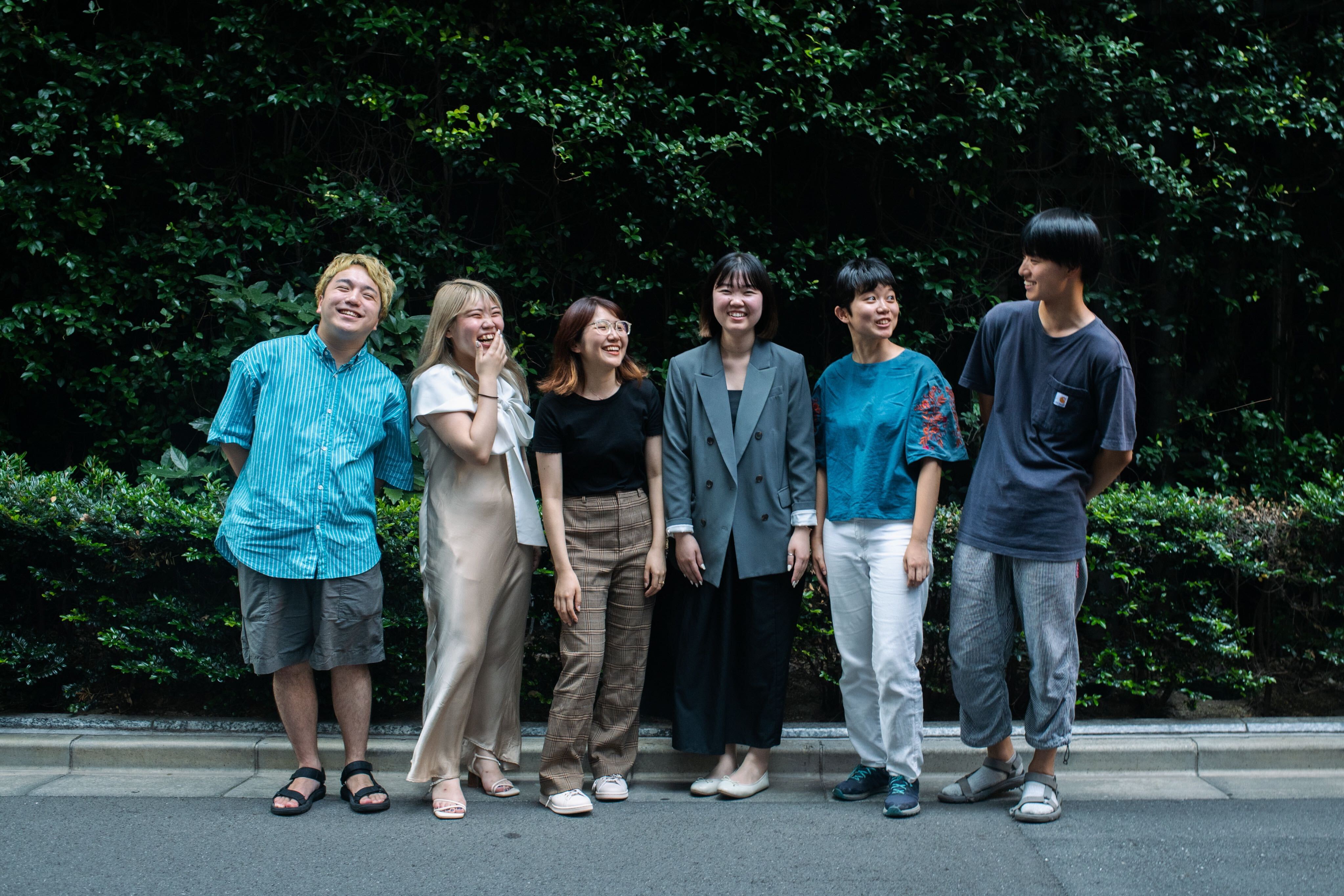
久保遼(19) /大学生
地域社会という視点から様々な社会問題に対して活動する中で、特に地方における議員の多様性の無さは、若者の声の届きにくさ、政治への無関心さを助長する深刻な問題であると感じています。そのような思いから、この活動に参加することを決めました。
中村涼夏(21)/大学生
若者の声に耳を傾けるだけでなく、届いて変えられる政治がなぜ存在しないのか。気候危機と向き合い、地方に住みながら感じることです。「日本の政治だから」という理由で諦めることなく、「若者だから」の理由で蔑ろにされないために原告になることを決意しました。
中村涼香(23)/大学生
能力や経験値は年齢に比例しないにも関わらず、現行のルールは若者の政治参加を制限しています。高齢化が進む社会で私たち若い世代の声が社会に届く仕組みを早急に作る必要があります。これからの未来を生きる私たちにも選択権があるのは当然のことだと考えます。
能條桃子(25)/一般社団法人NO YOUTH NO JAPAN代表理事・FIFTYS PROJECT代表
2019年デンマーク留学中、21歳女性の国会議員の存在に感銘を受け団体を設立、若い世代の政治参加を促進する活動に邁進してきました。投票率が低い理由を若者の責任と矮小化せず、若い世代がいない政治にも問題があると提起をしたいと思い、企画・参加しています。
Chico.(23)/Sophies代表
昨今あちこちで叫ばれる若者の政治離れ。大人たちは「最近の若者はこれだから。」と言いますが、若者が興味を持てない社会背景に目を向け、若者が自ら立ち上がれる土台創りが重要だと思います。日本の未来は限られた大人ではなく、あらゆるセグメントの人々が交わり対話しながらアップデートされる社会であることを望みます。
吉住海斗(23)/合同会社トンボ代表社員
多くの人が18歳や22歳で”卒業”をきっかけにファーストキャリアを選ぶ時代。そのタイミングで政治家を選べないことは、現行の選挙制度の大きな欠陥であると感じていました。そんな背景もあり今回の公共訴訟、強く共感し原告として活動に参加させていただきます!
寄付のお願い
教育、先端技術、雇用、福祉、メンタルヘルス、環境問題、安全保障、ジェンダー、多様性など様々な問題が複雑に絡み合う社会は限られた大人たちだけでなく、あらゆる背景を持つ人々が交わり対話しながらアップデートされていく必要があります。今回のムーブメントを通して、戦後変わらない立候補年齢についても社会全体で議論し、アップデートされることを期待します。
社会の一員である若い人が直接関わって、自らの手で変えられる政治を実現するためにご支援のほど、よろしくお願いいたします。
資金の使途
- 訴訟費用:印紙代・コピー代などの実費費用。
- 学者に依頼する意見書費用:専門的な分野ですので、憲法学者や行政法学者等の専門家に意見書を執筆していただくことを予定しています。
- 海外の知見の証拠化:海外の専門家や現職議員などからヒアリングをしたり、意見書を提出していただくことを検討しています。これには通常の謝礼の他翻訳費用も必要となります。
- 弁護団、原告などの交通費:訴訟は東京で行います。原告や弁護団の一部が地方から東京での裁判に出頭する際の交通費、専門家の方などに東京にお越しいただく際の交通費を寄付金から支出する予定です。
- イベント開催・広報費用:この裁判に関するイベントや広報費用にも寄付金を用いたいと考えています。
- 弁護士費用:弁護団員の着手金、成功報酬、出張日当等に活用したいと考えています。
弁護団について
戸田善恭(主任)法律事務所LEDGE
亀石倫子 法律事務所エクラうめだ
谷口太規 東京パブリック法律事務所
西愛礼 しんゆう法律事務所
井桁大介 宮村・井桁法律事務所
向井佑里 東京パブリック法律事務所
弁護団からのメッセージ
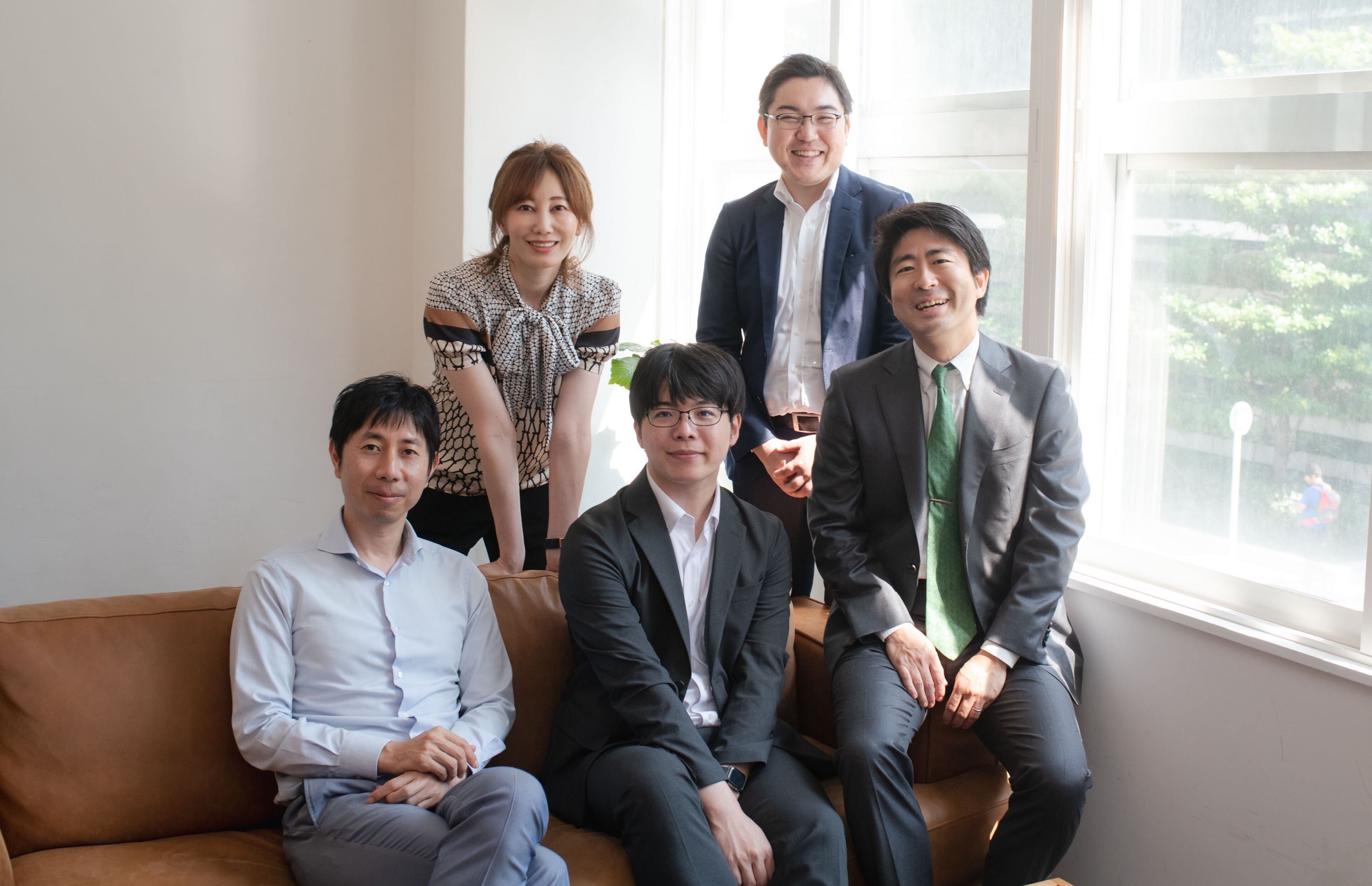
このような年齢制限が設けられたのは約70年前のことです。この間、国内外で、多様な意思を反映することは充実した民主主義に資するとの考えや、若者の自己決定権を尊重する動きが強まりました。こうした流れを受けて、日本でも2015年には選挙権年齢を18歳に、2018年には成人年齢を18歳に引き下げる法律が制定されています。選挙権年齢や成人年齢が引き下げられた際、立候補年齢を引き下げるべきだという声が多く出ましたが、具体的な立法の動きはありません。
立候補の自由は憲法の基本理念である国民主権原理の要請であり、合理的理由なく奪われてはならない憲法上の基本的人権です。25歳又は30歳に至っていなくても大人より優れた若者たちが数多くいることを私たちは知っています。この裁判では、裁判という公正・公平な議論を通じ、若者=大人より経験・能力等が低いという社会通念の是非を問うていきたいと考えています。
LEDGEについて
LEDGEは、特定の公共訴訟を支えるために作られた、各種専門家によるチームです。本訴訟はLEDGEの支援を受けています(本訴訟の弁護団の一部はLEDGEのメンバーです。)
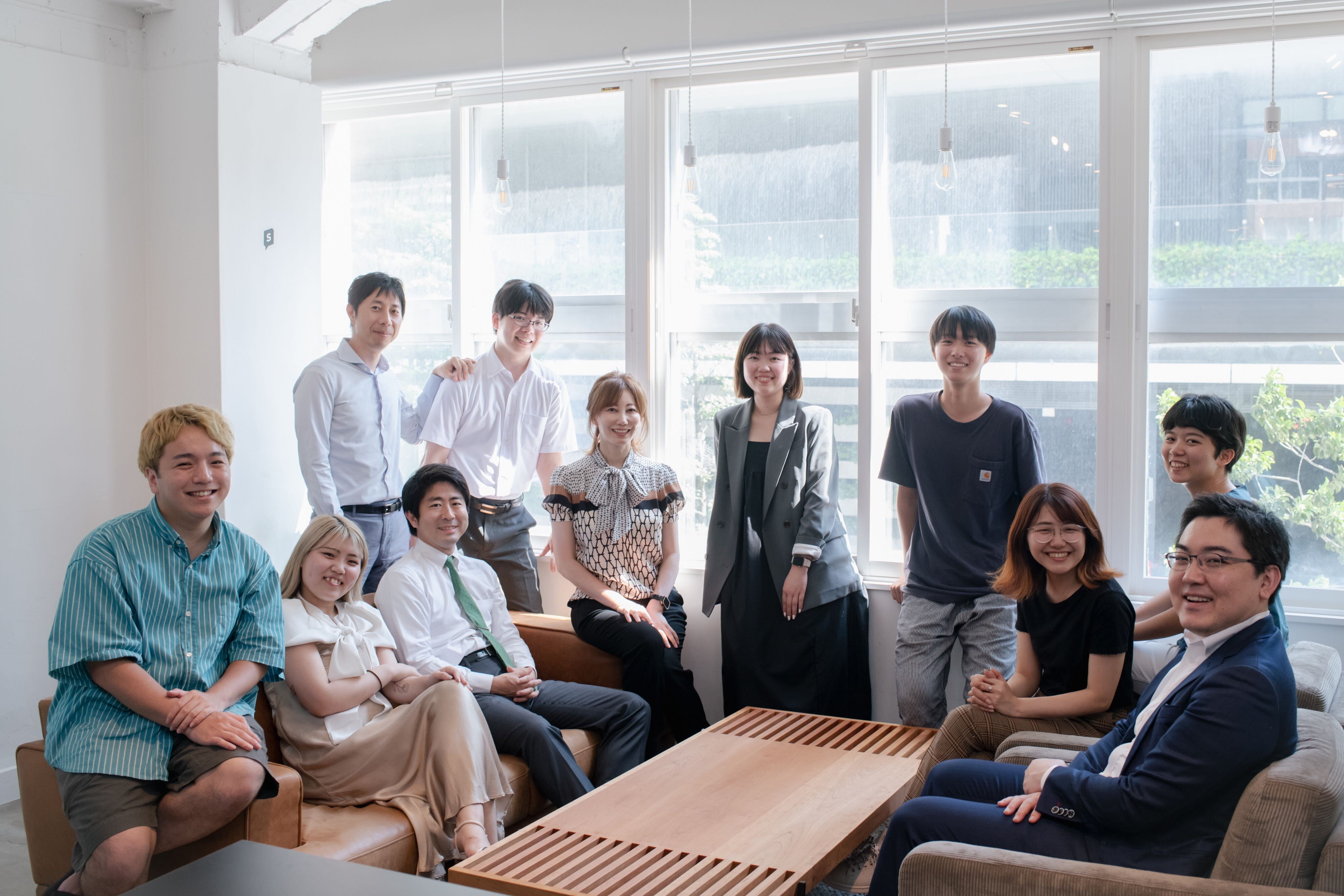
|
立候補年齢を引き下げるためのプロジェクト ウェブサイト|Project for Lowering the Age of Candidacy Website |
Why the current age at which candidates can run is a problem
We are seeking a lowering of the age at which people can run for office (the right to be elected) through legal proceedings. Currently, the age at which people can run for office (the right to be elected) in Japan remains unchanged since the end of the war, at 25 and 30 years old.

More than 70 years have passed since the end of the war, and society has changed dramatically. In 2016, the Public Offices Election Act was revised to allow people to vote from the age of 18, but the age at which people can run for office has not been changed, continuing to restrict young people's direct political participation. What is even more pointable is that no one can explain the rational reason why the age at which people can run for office should be set at 25 or 30.

Currently, most of the representatives of the electorate in parliament are middle-aged or older. Their average age is nearly 60, far below the average age of the general public, and important matters affecting everyone living in Japan are decided by a select group of people.

People in their 40s are considered young politicians, and it is taken for granted that there is a generational gap between them and those in their 20s and 30s. The voices of young people, as the people directly involved, are evaporating without being heard in the political arena. This is a serious problem that also contributes to young people's apathy towards politics. While young people's apathy towards politics and low voter turnout are seen as major issues, I believe that this political system also has its problems.
In an age where many people choose their first career upon graduation at age 18 or 22, however, the profession of "politician" cannot be chosen at that time. If one were to run for office under the current age of candidacy set by the Public Offices Election Act, by age 25 they would have been working for several years, and by age 30 they would have been married, had a child, and would be raising young children. Even if one reaches the legal age to run for office in these fluid life stages, it is not easy to interrupt or abandon one's career and immediately run for office unless one has a solid foundation that allows them to return to it if they are defeated. If the age of candidacy were lowered and one could choose politics as one's first career, it would be possible to make this decision with less risk.
Japan's candidate age is too high compared to other countries
Globally, only a minority of OECD countries have set the candidacy age at 25 or older. Of the 38 countries, 23 set the candidacy age at 18 and 10 at 21, meaning that countries that set the candidacy age at 21 or younger account for approximately 87% of the total.
*Added October 19, 2025: At the time of publication of " Eligible Voting Age in Major Countries (Data) " (2020), compiled by the National Diet Library, there were 36 member countries. Subsequently, Colombia joined in 2020, and Costa Rica in 2021, bringing the total to 38 countries. Additionally, the voting age has been lowered in South Korea (2021), Lithuania (2022), and Mexico (2023). The above reflects this information (as of October 2025). For more information, please see " Eligible Voting Age in Major Countries ."

In fact, these countries did not lower the age for running for office from the beginning. Over the past few decades, they have made successive reforms to their systems to allow young people to run for office.
For example, in the UK, in 2004 the Electoral Commission recommended lowering the age at which people can run for office, citing the following reasons: (1) there are examples internationally of the age at which people can run for office being the same as the voting age; (2) there may be young people under the age of 21 who are interested in elected office and are able to perform the duties of such office satisfactorily; and (3) even without comprehensive restrictions on running for office through the provision of a voting age, voters can decide through elections whether or not a person is suitable for elected office. In response, the legislature lowered the age at which people can run for office from 21 to 18 in a 2006 amendment to the law.
In Germany and France, the age to run for office was lowered in 1974 and 2011 through legislation that made the age to run for office the same as the age of majority or voting age.

Of course, there are no reports of any adverse effects from lowering the age of candidacy in these countries. In fact, in all countries, it has been reported that lowering the age of candidacy has increased interest and commitment in politics among younger generations.
In other words, there is almost no rational reason to continue maintaining the age for running for office at 25 or 30. Those opposed to lowering the age argue that young people lack knowledge, experience, and discretion, but this is a typical example of prejudice. There is no rational basis for uniformly regarding young people as inferior without exception.
Why the trial?
Politicians have been lobbying for a lowering of the age to run for office (the right to run for office). When the age of majority was lowered in 2016, there were calls for a corresponding lowering of the age to run for office. However, seven years later, the age to run for office has yet to be lowered. While many opposition parties have called for a lowering, the ruling party has not made any concrete efforts to put it on the political agenda. Young people aged 18 to 25 constitute a minority in modern Japanese society, accounting for less than 20% of the population. For incumbent politicians, who are overwhelmingly middle-aged or older, many of their direct supporters are the same age as themselves, so there is little benefit to listening to the voices of young people. In fact, lowering the age to run for office could even be seen as a disadvantage for incumbent politicians, as it would increase their rivals. While it is structurally difficult to expect incumbent politicians to take the lead in reforming the law, it is also difficult to expect young people's political participation to become a key election issue in this complex and turbulent society. In other words, legislative solutions are unlikely. Issues like these deserve judicial debate. Armed with evidence and logic, we seek to reform the system through the court process.
The plaintiffs' thoughts

Ryo Kubo (19) / University student
While working on various social issues from a local community perspective, I feel that the lack of diversity among local politicians, in particular, is a serious problem that makes it difficult for young people's voices to be heard and contributes to their apathy towards politics. It was with this in mind that I decided to participate in this activity.
Suzuka Nakamura (21) / University student
Why is there no politics that not only listens to the voices of young people, but also reaches them and changes them? This is what I feel while facing the climate crisis and living in a rural area. I decided to become a plaintiff, not to give up just because "it's Japanese politics" and to ensure that people are not ignored just because "they are young."
Suzuka Nakamura (23) / University student
Even though ability and experience do not correlate with age, current rules limit young people's political participation. In an aging society, we urgently need to create a system that allows the voices of the younger generation to be heard. I believe that it is only natural that we, who will live in the future, have the right to choose.
Momoko Nojo (25) / Representative Director of NO YOUTH NO JAPAN General Incorporated Association / Representative of FIFTYS PROJECT
While studying abroad in Denmark in 2019, she was inspired by a 21-year-old female member of parliament and founded an organization to promote political participation among young people. Rather than trivializing the low voter turnout by blaming young people, she plans and participates in events with the aim of raising awareness that politics without young people is also problematic.
Chico. (23) / Sophies representative
There's been a lot of talk recently about young people losing interest in politics. Adults say, "That's just how young people are these days," but I think it's important to look at the social background that's causing young people to lose interest and create a foundation that will allow young people to stand up for themselves. I hope that Japan's future will not be one in which only a limited number of adults exist, but one in which people from all segments can interact and engage in dialogue, constantly updating themselves.
Kaito Yoshizumi (23) / Representative of Tombo LLC
In this day and age, many people choose their first career after "graduating" at the age of 18 or 22. I feel that the inability to choose politicians at this time is a major flaw in the current electoral system. With this background, I strongly sympathize with this public lawsuit and will be participating as a plaintiff!
Request for donations
Our society is one in which a variety of issues, including education, advanced technology, employment, welfare, mental health, environmental issues, security, gender, and diversity, are intricately intertwined, and it is necessary for it to be updated through dialogue and interaction between people of all backgrounds, not just a select few adults. Through this movement, we hope that society as a whole will discuss and update the age at which people can run for office, which has remained unchanged since the end of the war.
We would appreciate your support in realizing a politics in which young people, who are members of society, can directly get involved and make changes with their own hands.
Use of funds
- Litigation costs: Actual costs such as stamp duty and copying fees.
- Cost of written opinions from scholars: As this is a specialized field, we plan to have experts such as constitutional law scholars and administrative law scholars write opinions.
- Evidence of overseas knowledge: We are considering holding interviews with overseas experts and current politicians and asking them to submit written opinions. This will require translation costs in addition to the usual remuneration.
- Travel expenses for the legal team, plaintiffs, etc.: The lawsuit will be held in Tokyo. Donations will be used to cover the travel expenses of the plaintiffs and some of the legal team when they travel from the countryside to appear in court in Tokyo, as well as the travel expenses of experts and others when they come to Tokyo.
- Event hosting and public relations costs: We would also like to use donations to cover events and public relations costs related to this trial.
- Legal fees: We would like to use the funds for the legal team's retainer fees, success fees, travel allowances, etc.
About the defense team
Yoshiyasu Toda (Chief) LEDGE Law Office
Michiko Kameishi, Eclat Umeda Law Office, Taiki Taniguchi, Tokyo Public Law Office, Airi Nishi, Shinyu Law Office, Daisuke Igeta, Miyamura & Igeta Law Office, Yuri Mukai, Tokyo Public Law Office
Message from the defense team

These age restrictions were put in place about 70 years ago. During this time, there has been a growing movement both domestically and internationally to respect the right of self-determination of young people, as well as the belief that reflecting diverse opinions contributes to a fulfilling democracy. In response to this trend, Japan also enacted laws to lower the voting age to 18 in 2015 and the age of majority to 18 in 2018. When the voting age and the age of majority were lowered, many people called for the age of candidacy to be lowered as well, but there has been no concrete legislative movement.
The freedom to run for office is a requirement of the principle of popular sovereignty, a fundamental principle of the Constitution, and is a fundamental constitutional human right that must not be taken away without reasonable grounds. We know that there are many young people who are more capable than adults, even if they are not yet 25 or 30 years old. In this trial, we hope to question the validity of the socially accepted notion that young people have less experience and ability than adults, through fair and impartial debate.
About LEDGE
LEDGE is a team of experts formed to support specific public lawsuits. This lawsuit is being supported by LEDGE (some of the lawyers in this lawsuit are members of LEDGE).

|
立候補年齢を引き下げるためのプロジェクト ウェブサイト|Project for Lowering the Age of Candidacy Website |
関連コラム
-
2025. 6. 26
-
2023. 12. 27
-
2023. 10. 11
あなたにおすすめのケース Recommended case for you
- 外国にルーツを持つ人々 Immigrants/Refugees/Foreign residents in Japan
- ジェンダー・セクシュアリティ Gender/Sexuality
- 医療・福祉・障がい Healthcare/Welfare/Disability
- 働き方 Labor Rights
- 刑事司法 Criminal Justice
- 公正な手続 Procedural Justice
- 情報公開 Information Disclosure
- 政治参加・表現の自由 Democracy/Freedom of Expression
- 環境・災害 Environment/Natural Disasters
- 沖縄 Okinawa
- 個人情報・プライバシー Personal information/Privacy
- アーカイブ Archive
- 全てのケース ALL
